Genealogy Facts and Tips
What is Genealogy and How Do You Do It?
Genealogy is the methodical research of your ancestors. You learn about your family and your place in your family tree. Family history tells the story of your ancestors' lives beyond facts and figures. An ancestor is a person from whom you descend. Thus, you are descendants of your ancestors. A relative is someone with whom you share a common ancestor but who may not be in your direct line of descent. The information you gather will provide a fuller picture of your family and their place in history.
Take your time. Begin genealogy research by focusing on one or two families so as not to become overwhelmed. The records will be there when you are ready to research other parts of the family.
Get organized! Whether you opt for a paper filing system or a genealogy software program, you should be able to find documents you’ve collected quickly, with little effort. As you find and collect information about your ancestors, fill in a pedigree chart and family group sheets. They will become your road maps.
Begin with yourself. Record birth, schools, jobs, siblings, marriage, children, then climb your family tree one generation at a time by recording all the same information for your parents, grandparents, great-grandparents, etc.
Start your research at home. Before exploring repositories like Ancestry or FamilySearch, go through your home, first, and that of your parents and grandparents. You’d be surprised at what you’ll find---birth, marriage, divorce, and death certificates, wills, photographs, school yearbooks, military papers, diaries/journals, newspaper articles, obituaries, funeral programs, etc. And don’t forget to interview family members, particularly older ones for oral histories!
As you research, use the diagram to the right as a guide to stay focused. You should develop a research question (“What specifically am I looking for?”) and a research plan (“What record sets should I consult for answers?”), then apply all five principles to each item you research. Accuracy is the goal of genealogy research. Otherwise, your work is fiction. Use of this method will provide a greater chance for your desired outcome.
Finally, consider joining a genealogy society in your research area. They can be great support systems.
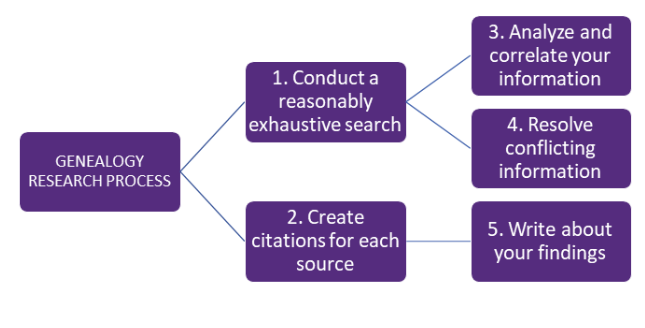
Board for Certification of Genealogists. Genealogy Standards, Second Edition. Washington, DC. Ancestry.com. 2019.
Geographic Focus:
Upstate South Carolina
For this project, we focus on the counties of upstate South Carolina. Explore the map below with links to each county's FamilySearch Wiki page with several genealogy and research resources.
Using the South Carolina Atlas of Historical County Boundaries, learn how all 46 South Carolina counties were formed, when the jurisdictional boundaries changed, and why.
Common Record Types to Research
Census Records
The U.S. federal population census has been taken every 10 years since 1790. A census is an official counting of the population living in the United States on a designated day, set at intervals. The census places an ancestor in a specific place, at a specific time. The latest census available to the public is the 1950 census. A census is closed to the public for 72 years after it is taken, which means the 1960 census will not be released until 2032. Begin with the most recent census and work backwards one generation at a time. Census records were generated by enumerators, some of whose handwriting was almost illegible. The first time emancipated African Americans appear enumerated as free people was the 1870 federal population census and the state census before that, if one was taken. Many states took their own censuses. This was done between the federal censuses, on years ending in 5. Don't assume that all information in the census is correct. It's only as good as the knowledge of the person reporting it, the informant. The vast majority of the 1890 census was destroyed by fire and water damage from putting out the fire, so it is not likely you will find your ancestor for that year. In addition to the federal census population count, there are several “special censuses": Slave, Industry & Manufacturing, Agriculture, Mortality, Social Statistics, Union Veteran & Widow, Defective, Dependent & Delinquent.
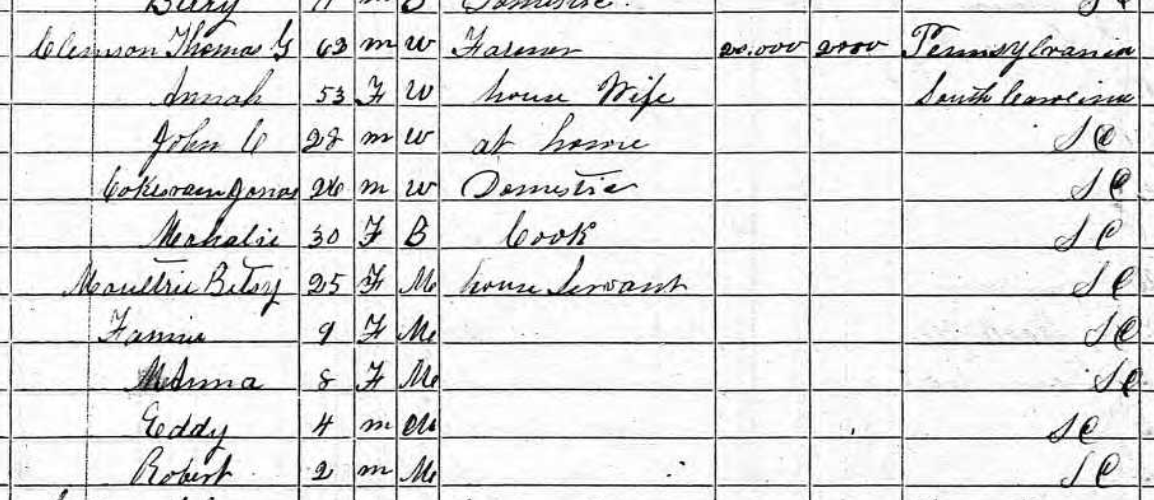
Image of 1870 Federal Census, Thomas Green Clemson household, Pendleson Township, Anderson, South Carolina, Ancestry.
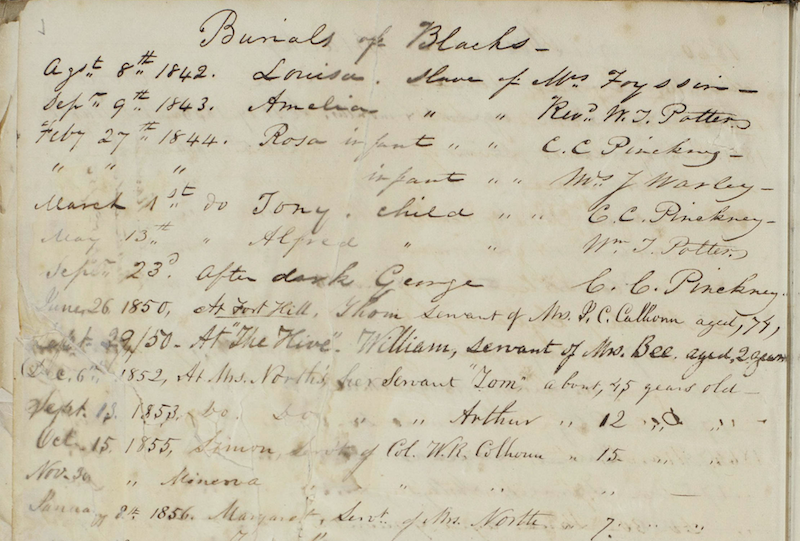
Excerpt listing burials of enslaved people at local plantations, Register of St. Paul's Episcopal Church in Pendleton, South Carolina, 1820-1911, South Carolina Digital Library, Copyright Lake Hartwell Country.
Church and Cemetery Records
Church records may include births, christenings, marriages, deaths and burials. Be sure you have the correct church name and/or religious denomination. Visit the cemetery and take a picture of the tombstone or check online to see if the tombstone was recorded on the Find A Grave website. Check obituaries in that time frame, often found in newspapers, as well as funeral home records. When searching old cemeteries, always check outside the fence. Many criminals, "sinners," and those of mixed races were buried outside the cemetery proper. If you are not sure which church your ancestor attended, search the churches closest to the home first, then broaden your search in ever-widening circles. Check cemetery records with the church, sexton, and funeral directors. Another online record source you can search is Billion Graves. The South Carolina Genealogical Society Cemetery GPS Mapping Project is a resource that contains 17,000+ cemeteries and 200+ Cemetery Survey Book Surname Indexes.
Court House Records
Courts exist on the county, state, and federal level. It is best to start at the county level, in the records closer to your ancestor, then work your way up. Records that can be found in courthouses are probate records, i.e., wills, estate inventories, letters of administration and guardianship, and land deeds. A testator is a person who has written a will to be executed after his or her death. There are three types of wills: attested, holographic, and nuncupative. The attested will is the most common and is prepared for the testator. A holographic will is handwritten by the testator himself. A nuncupative will details the deathbed wishes of the testator, recorded by a witness present at the bedside. All wills must be witnessed. A person who dies intestate is someone who dies without creating a will. An administrator is an appointee of the court who settles the estate of a deceased person who died intestate, without leaving a will. Deed books are a rich source of information. Many legal documents other than deeds can appear in deed books. They might include Bills of Sale, Prenuptial Agreements, Powers of Attorney, Contracts, Affidavits, Wills and Inventories, and Voter and Jury Lists.
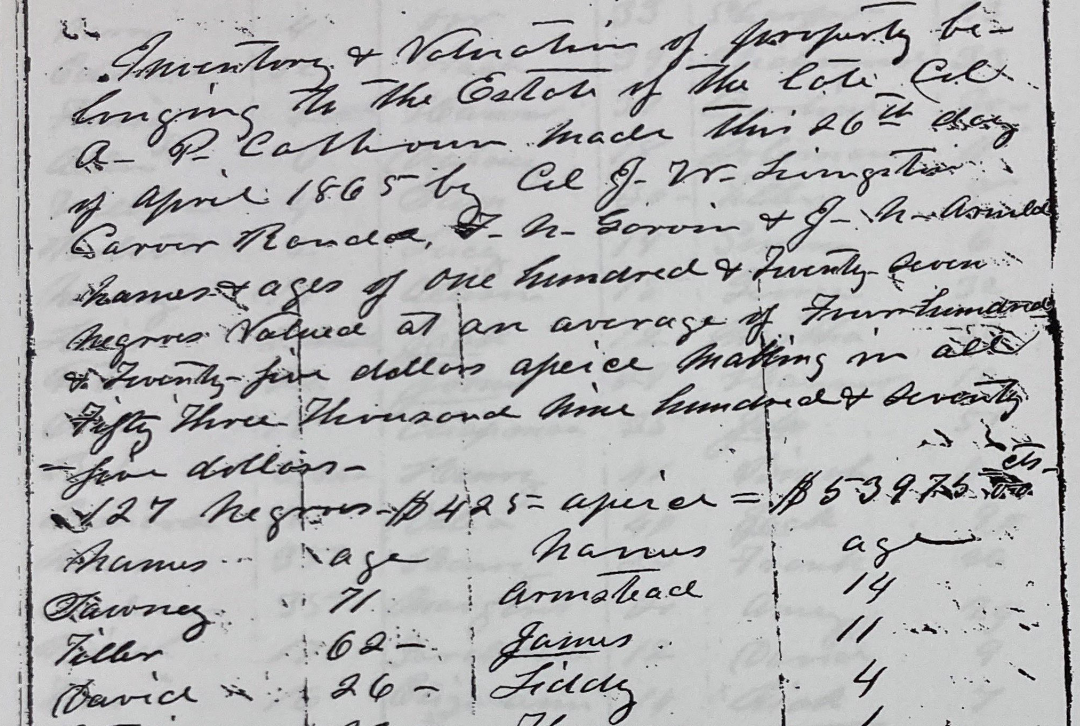
Estate Inventory of Andrew Pickens Calhoun, April 26, 1865, Pickens County Probate Court Records 1864-1865, Box 82, No. 875, Roll 14, South Carolina Room, Greenville Library.
Genealogy Resources

FamilySearch
The Church of Jesus Christ of Latter-day Saints provides FamilySearch free of charge to everyone, regardless of tradition, culture, or religious affiliation. FamilySearch resources help millions of people around the world discover their heritage and connect with family members. They help people discover their family’s history through their website, mobile apps, and in-person at over 5,000 local family history centers around the world.

kinkofa
kinkofa (KIN·koh·fah: inspired by the Ghanian Adinkra symbol, Sankofa which loosely translated means to re-trace one’s history) is making it easier than ever for Black folx to uncover, document, and preserve their unique origin stories. Their digital platform was intentionally designed to reconnect Black families. Through partnerships with public and private organizations, they amplify stories that honor and enhance the public’s understanding of African Americans’ contributions to history.
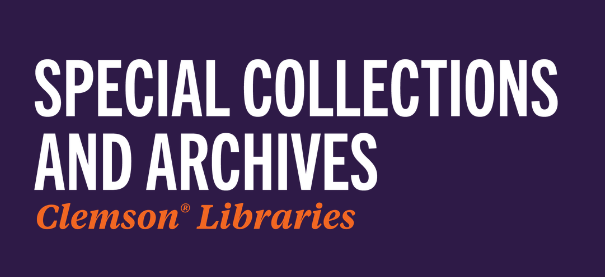
Black Heritage in the Upper Piedmont Project
The Black Heritage in the Upper Piedmont Project, under the direction of Dr. W. J. Megginson, author of African American Life in the South Carolina Upper Piedmont 1780-1900, in the early 1990s, documented the rich heritage of the local African American community through photographs, oral history interviews, and documentary research.
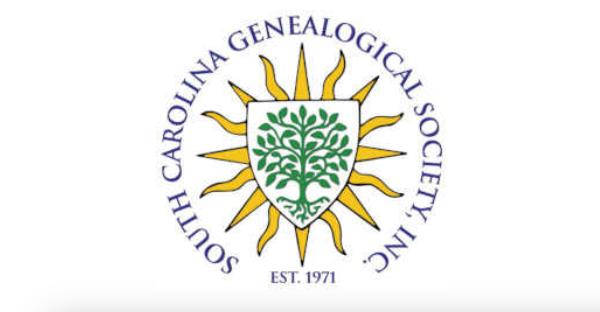
SCGS Old Pendleton District Chapter
A chapter of the SCGS, they are a genealogy group covering Anderson, Oconee, and Pickens Counties, who meet in Central, South Carolina. They promote and assist chapter members and the wider community with research assistance and information about available family history resources, as needed and within the organization’s ability, through their state and local chapters.
African American Genealogy
African American Resources for South Carolina at FamilySearch Describes research strategies and information about African American families from South Carolina. Together with the African American Genealogy Wiki, both help understand how to use other African American genealogical records.
AfriGeneas: African Ancestored Genealogy Website for African American genealogy and researching African ancestry in the Americas.
Afro-American Historical and Genealogical Society Supports scholarly research, provides resources for historical and genealogical studies, creates networking opportunities, and assists members in documenting their family stories.
Ancestry.com Freedmen's Bureau Records Available for free, this collection provides digitized documents from the Freedmen's Bureau, created in 1865 to help freedpeople after enslavement with relief programs, land assistance, medical care, and educational support.
International African American Museum Center for Family History Research center in Charleston, SC, that focuses on providing African American genealogical research resources and assistance for the public.
Mapping the Freedmen's Bureau Identifies the location of all Freedman’s Bureau offices that served formerly enslaved and white refugees, branches of the Freedman’s Savings Bank, Freedmen Schools, contraband camps, and battle sites locations for black men who fought in the US Colored Troops.
My African Roots: Upstate SC Black Heritage Resources hosted by the SC Genealogical Society Provides information on church and cemetery histories, museums, plantations, voter registrations, as well as links to useful publications and research portals.
Quick Guide to African American Online Genealogy Records at FamilySearch.org Access point to records and information about how to begin your research, tips, records, understanding the important time periods, and sources available.
Research Guide to African American Family Research on Ancestry.com A two-part guide on discovering this unique history from the 20th century and back to the Civil War, including clues and tips to the 1870 census for continuing your research back through emancipation.
Robert Frederick Smith Explore Your Family History Center at the National Museum of African American History and Culture Research guidance, workshops, and virtual sessions for African American genealogy.
SC Dept of Archives and History – African American Genealogy This guide describes government records and finding aids at the South Carolina Department of Archives and History (SCDAH) for locating information about ancestors.
Slave Voyages 2.0 Compiles publicly accessible university records from the largest slave trades in history, showing how more than 12 million African people were forced across the Atlantic via slave ships, and hundreds of thousands more trafficked within the Americas, where they were taken, slave rebellions, the horrific loss of life during the voyages, the perpetrators, and much more.
General Genealogy
Ancestry.com Create your family tree using research documents on individual and family histories, including census, birth, marriage, death certificates, military records, and more. Subscription required.
Find A Grave Search for individual memorials and cemeteries across the United States.
Fold3 by Ancestry Stories, photos, and personal documents of the men and women who served in the military from the U.S. National archives, The National Archives of the U.K. and other international records.
Historical Newspapers of South Carolina Provides free online access to historical local and regional newspapers originating throughout South Carolina since 1815.
Library of Congress Search historical images, city directories, newspapers and more for free online.
Newspapers.com Search the largest online newspaper archive consisting of 852 million+ pages of historical newspapers from 27,100+ newspapers from around the United States and beyond. Subscription required.
Pickens County Library System: Genealogy, Local History and Newspapers Collection of subscription databases accessible for free from home or the library, including Ancestry.com.
South Carolina Room at the Hughes Main Library in Greenville County An extensive collection of genealogy and local history materials, searchable online, focused on South Carolina history, Greenville and other surrounding upstate counties, and many other United States locations.
The USGenWeb Project Provides free genealogy resources at the county and state level.
